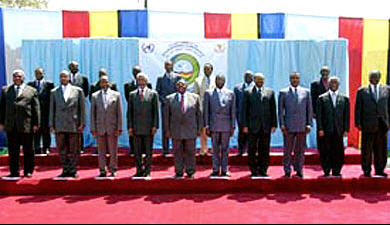With the signing of the Nairobi pact on Friday December 15 2006 by DRC, Angola, Burundi, Central African Republic, Republic of Congo, Kenya, Rwanda, Sudan, Tanzania, Uganda and Zambia, it paves the way for security, stability and development in the region, after years of conflict. MONUC welcomed the signing of the pact that will pave the way for peace in the region, especially in DR Congo, where MONUC has been working to promote peace and assist the Congolese in rebuilding their country after years of dictatorship and war. "MONUC hopes that the different national parliaments ratify the agreement as soon as possible, in the interests of peace, security and for the well being of all the people in the region," added MONUC spokesperson Kemal Saiki.
Many African state leaders, including DRC president Joseph Kabila were in Nairobi Kenya for the two day summit that will go a long way to bringing the region out of the vicious cycle of humanitarian disaster, poverty, and repeated conflict.
As part of the pact, the leaders signed up to a long list of governance, humanitarian and economic programmes, as well as a non-aggression and mutual defence protocol which will not tolerate the presence of insurgents on their territories.
The programmes will be financed by an African Development Bank-managed fund, made up of mandatory contributions from member states and voluntary payments from donors.
The Great Lakes region has been a theatre of violence and humanitarian catastrophe over the last decade, resulting in millions of deaths, the widespread displacement of people and the collapse of physical, economic, and social infrastructure.
“We have now made a commitment to transform our region from a zone of conflict, violence and mistrust to one of peace, stability and development,” President Kabila said.
The Great Lakes pact includes a $225 million security action plan to disarm rebel groups in Eastern DRC, and along border areas in Sudan, Kenya and Uganda.
“Special emphasis will be placed on the thorny issue of armed groups. Our reciprocal confidence will end the problem once and for all, and we will not spare any action to implement the pact,” President Kabila said.
He went on to say that dialogue and military force were the two main options in dealing with the rebels, who are a destabilising force for the DRC and the wider region.
“We are trying to encourage them to stop what they are doing. The military option is quite expensive, but we still have it and we will use it if and when we see fit.”
Ms. Besida Tonwe, the Head of United Nations Office for the Coordination of Humanitarian Affairs (OCHA), in Central and East Africa, said that the conference was a long process of consultations in helping the Great Lakes Region to reconcile, rehabilitate, and reconstruct their societies in a politically delicate process.
“It is also a process which in the future will continue to require financial support from the donor community and coherent assistance from the humanitarian community. It is now of utmost importance that there is a follow-up on the national implementation of the legal protocols adopted with the pact,” she said.
“The three protocols on humanitarian and social issues addressing sexual violence against women and children, property rights of returning persons, and the protection of Internally Displaced Persons (IDPs), are of the utmost importance,” she concluded.
Related articles
- • DRC and Rwanda Sign Declaration of Principles for Peace in Eastern Congo (April 25, 2025)
- • European Union Sanctions Rwanda and M23 Officials over Congo Conflict (March 17, 2025)
- • Canada and Germany Impose Sanctions on Rwanda for Supporting M23 Rebels (March 4, 2025)
- • UK Suspends Financial Aid to Rwanda Over M23 Rebellion (February 25, 2025)
- • European Union Suspends Defence Consultations with Rwanda (February 24, 2025)
- • Tshisekedi Announces Government of National Unity and Calls for Unity Against M23 Rebels (February 23, 2025)
- • UN Security Council Calls on Rwanda to Stop Supporting M23 Rebels in DR Congo (February 22, 2025)
- • US Sanctions Rwanda's Minister James Kabarebe for Central Role in DR Congo Conflict (February 20, 2025)
- • Rwanda-Backed M23 Rebels Summarily Executed Children in Bukavu, UN Reports (February 19, 2025)
- • DR Congo Citizens Head to Polls to Elect President, Members of Parliament (December 20, 2023)
- • 'Deadly environment' plus 'political and social' obstacles hinder Ebola fight, Security Council hears (July 24, 2019)
- • Ebola outbreak declared an international Public Health Emergency (July 17, 2019)
- • Felix Tshisekedi Sworn In as DR Congo President (January 24, 2019)
- • Constitutional Court Declares Tshisekedi Winner of Presidential Election (January 19, 2019)
- • Felix Tshisekedi Vows to Be the President of All Congolese (January 10, 2019)
- • Felix Tshisekedi Elected DR Congo President (January 10, 2019)
- • DR Congo Delays Results of December Election (January 6, 2019)
- • Botswana Urges Joseph Kabila to Step Down (February 26, 2018)
- • No elections in DR Congo in December without electronic voting machines: INEC (February 13, 2018)
- • US Warns DR Congo Against Electronic Voting for Delayed Election (February 12, 2018)
- • Felix Tshisekedi accuses INEC of illegally prolonging Kabila's mandate (October 24, 2017)
- • DRC Seeks Arrest of Presidential Candidate Moise Katumbi (May 19, 2016)
- • Papa Wemba Is Buried in Kinshasa (May 4, 2016)
- • Papa Wemba Awarded Highest National Honor as Thousands Pay Tribute (May 2, 2016)
- • Peacekeepers, Congo Army to Resume Joint Fight Against Rwandan Rebels (January 28, 2016)
- • Political tensions 'running high' in DR Congo ahead of 2016 elections (October 7, 2015)
- • UN Report Blames Ugandan Islamists for 237 Killings in DR Congo (May 14, 2015)
- • Rights Groups: DR Congo Must Free Pro-democracy Activists (April 13, 2015)
- • DRC Army Putting Pressure on FDLR (April 1, 2015)
- • Police Open Fire on Crowd Protesting Election Law Change (January 19, 2015)







